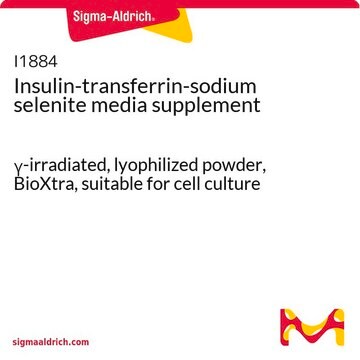N6530
N1 Medium Supplement (100×)
solution, sterile-filtered, suitable for cell culture
Synonym(s):
N1 Supplement
Sign Into View Organizational & Contract Pricing
All Photos(1)
About This Item
UNSPSC Code:
12352207
NACRES:
NA.77
Recommended Products
sterility
sterile-filtered
form
solution
technique(s)
cell culture | mammalian: suitable
impurities
endotoxin, tested
storage temp.
2-8°C
Related Categories
General description
N1 Medium Supplement (100×) can be used as a supplement to produce complete N1 neural cell growth media or closely related media.
Application
N1 Medium Supplement (100×) has been used as:
- a component of the proliferation medium for culturing oligodendrocyte-like cells and neuroblastoma cells
- a supplement in the Dulbecco′s modified Eagle medium (DMEM/F12) to culture human oligodendrocytes
- a component of the α-minimum essential medium (MEM) for culturing induced primary retinal pigment epithelium (ipRPE) monolayers
Other Notes
Contains 0.5mg/ml recombinant human insulin, 0.5mg/ml human transferrin (partially iron-saturated), 0.5μg/ml sodium selenite, 1.6mg/ml putrescine, and 0.73μg/ml progesterone.
Preparation Note
Prepared in Earle′s Balanced Salt Solution (EBSS) without phenol red.
related product
Product No.
Description
Pricing
Storage Class Code
12 - Non Combustible Liquids
WGK
WGK 1
Flash Point(F)
Not applicable
Flash Point(C)
Not applicable
Personal Protective Equipment
dust mask type N95 (US), Eyeshields, Gloves
Certificates of Analysis (COA)
Search for Certificates of Analysis (COA) by entering the products Lot/Batch Number. Lot and Batch Numbers can be found on a product’s label following the words ‘Lot’ or ‘Batch’.
Already Own This Product?
Find documentation for the products that you have recently purchased in the Document Library.
Customers Also Viewed
Ludmila A Voloboueva et al.
Investigative ophthalmology & visual science, 46(11), 4302-4310 (2005-10-27)
To determine whether (R)-alpha-lipoic acid (LA) protects cultured human fetal retinal pigment epithelial (hfRPE) cells against oxidative injury and identify the pathways that may mediate protection. Cultured hfRPE cells were pretreated with various concentrations of LA for 14 to 16
Miguel Flores-Bellver et al.
Journal of extracellular vesicles, 10(13), e12165-e12165 (2021-11-10)
Age-related macular degeneration (AMD) is a leading cause of blindness worldwide. Drusen are key contributors to the etiology of AMD and the ability to modulate drusen biogenesis could lead to therapeutic strategies to slow or halt AMD progression. The mechanisms
Lucia Lichvarova et al.
Scientific reports, 10(1), 12518-12518 (2020-07-23)
An amendment to this paper has been published and can be accessed via a link at the top of the paper.
Michael Craigie et al.
Journal of neuroimmune pharmacology : the official journal of the Society on NeuroImmune Pharmacology, 13(2), 126-142 (2017-11-22)
JC virus (JCV) is a human polyomavirus and the etiologic agent of the demyelinating disease progressive multifocal leukoencephalopathy (PML). PML is observed in patients with underlying immunocompromising conditions, suggesting that neuro-immune interactions between peripheral immune cells and neuro-glia play an
Nicholas W Kieran et al.
Journal of neuroinflammation, 19(1), 10-10 (2022-01-08)
Astrocytes are the most numerous glial cell type with important roles in maintaining homeostasis and responding to diseases in the brain. Astrocyte function is subject to modulation by microRNAs (miRs), which are short nucleotide strands that regulate protein expression in
Our team of scientists has experience in all areas of research including Life Science, Material Science, Chemical Synthesis, Chromatography, Analytical and many others.
Contact Technical Service









